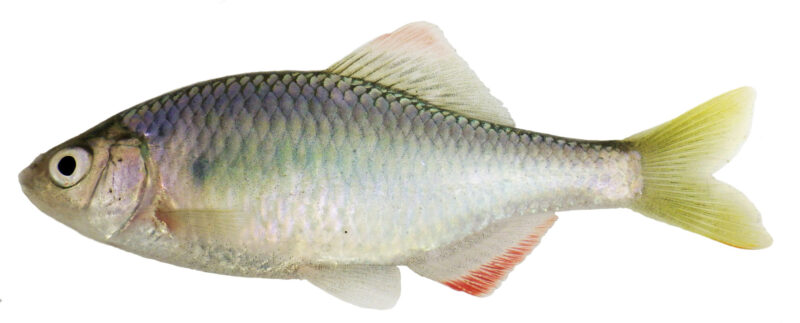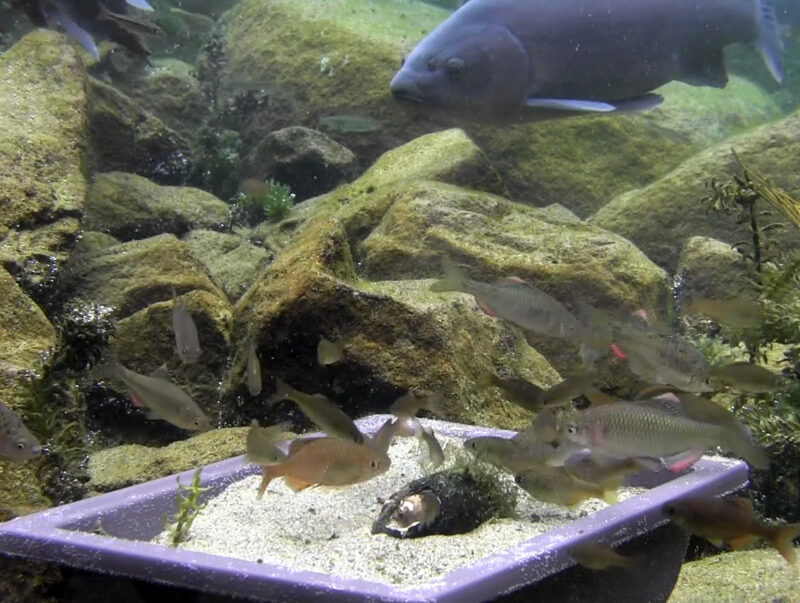Risk of extinction cascades from freshwater mussels to a bitterling fish
Decline of unionid mussels heightens hybridisation of native and introduced bitterling fish
Reproduction of native and invasive bitterling fishes and their hybridisation was studied in Japan. We collected mussels in which these bitterlings lay their eggs, kept them in aquaria, collected eggs/larvae ejected from mussels, and genotyped them. We found that hybrids occurred when local mussel density was low. The rapid decline of the host mussels and artificial introduction of an invasive congener interacted to cause the rapid decline of a native fish.
Bitterling fishes (Subfamily: Acheilognathinae) spawn in the gills of living freshwater mussels obligately depending on the mussels for reproduction. On the Matsuyama Plain, Japan, populations of unionid mussels—Pronodularia japanensis, Nodularia douglasiae, and Sinanodonta lauta—have decreased rapidly over the past 30 years. Simultaneously, the population of a native bitterling fish, Tanakia lanceolata, which depends on the three unionids as a breeding substrate, has decreased. Furthermore, a congeneric bitterling, Tanakia limbata, has been artificially introduced, and hybridisation and genetic introgression occur between them. Here, we surveyed the reproduction and occurrence of hybridisation between native and invasive species of bitterling fishes. We collected mussels in which these bitterlings lay their eggs, kept them separately in aquaria, collected eggs and larvae ejected from the mussels, and genotyped them using six microsatellite markers and mitochondrial cytochrome b sequences.
The introduced T. limbata was more abundant, had a longer breeding period, and produced more juveniles than the native T. lanceolata. Hybrids between the two species occurred frequently, and in total 101 of the 837 juveniles genotyped were hybrids. The density of P. japanensis was low, at most 0.42 individuals/m2. Nodularia douglasiae and S. lauta have nearly or totally disappeared from these sites. Hybrid clutches of the Tanakia species occurred more frequently where the local density of P. japanensis was low. The mussels were apparently overused and used simultaneously by three species of bitterlings.
The decline of freshwater unionid populations has heightened hybridisation of native and invasive bitterling fishes by increasing the competition for a breeding substrate. We showed that a rapid decline of host mussel species and an introduction of an invasive congener have interacted to cause a rapid decline of native bitterling fish. The degradation of habitat and the introduction of invasive species interact to cause a cascade of extinctions in the native species. In our study, obligate parasite species are threatened because the host species are disappearing, resulting in a serious threat of coextinction.
Reference URL: https://onlinelibrary.wiley.com/doi/10.1111/fwb.13629
Bibliographic Information
Decline of unionid mussels enhances hybridization of native and introduced bitterling fish species through competition for breeding substrate
Hiroki Hata, Yohsuke Uemura, Kaito Ouchi
Freshwater Biology
http://dx.doi.org/10.1111/fwb.13629
Fundings
- Ministry of the Environment, Japan, Grant/Award Number: 4RFd-1201
- Society for the Promotion of Science, Grant/Award Number: 15H02420, 17K07568, 18KK0208 and 20K06814
Media
-

Native bittering fish, Tanakia lanceolata
Freshwater fish distributed in Japan, South Korea, and China. Listed as near threatened in Japanese Red List.
credit : Hiroki Hata (Ehime University)
Usage Restriction : Please get copyright permission -

Unionid mussel, Pronodularia japanensis
Freshwater unionid species endemic in Japan.
credit : Hiroki Hata (Ehime University)
Usage Restriction : Please get copyright permission -

Excessive crowding of native and invasive bitterling fishes of a mussel
Excessive crowding of a native Tanakia lanceolata (orange fin) and invasive Tanakia limbata (olive brown body) of a mussel, Pronodularia japanensis, seen at the bottom center in the image.
credit : Hiroki Hata (Ehime University)
Usage Restriction : Please get copyright permission
Contact Person
Name : Hiroki Hata
Phone : +81-89-927-9638
E-mail : hata.hiroki.mk@ehime-u.ac.jp
Affiliation : Graduate School of Science and Engineering
